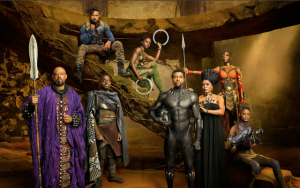BLACK PANTHER: 4 ½ STARS. “feels like the perfect movie for right now.”
 For those who complain that the recent spate of superhero movies aren’t about anything other than bombast and reaching into your wallet, I give you “Black Panther.” Directed by Ryan Coogler and starring Chadwick Boseman in the title role, it’s a movie that delivers wham-bam action but serves it up with compelling sides of mythology and social awareness.
For those who complain that the recent spate of superhero movies aren’t about anything other than bombast and reaching into your wallet, I give you “Black Panther.” Directed by Ryan Coogler and starring Chadwick Boseman in the title role, it’s a movie that delivers wham-bam action but serves it up with compelling sides of mythology and social awareness.
The film starts with a quick origin story, detailing the introduction of vibranium to the small (fictional) African nation of Wakanda. This mysterious metal is a wonder. Near indestructible, it can absorb kinetic energy and has imbued a Wakandan flower called the Heart-Shaped Herb with a supercharge that gives superpowers when ingested.
Cut to modern day. After his father’s death T’Challa (Boseman) is crowned King but just as he is ordained a rare Wakandan artefact made of vibranium is lifted from a London museum by two very bad men, Ulysses Klaue (Andy Serkis) and Erik “Killmonger” Stevens (Michael B. Jordan).
To retrieve the precious metal T’Challa, a.k.a. Black Panther, along with spy Nakia (Lupita Nyong’o) and warrior Okoye (Danai Gurira), travel to Korea where the artefact is about to be sold to CIA agent Everett K. Ross (Martin Freeman).
A wild battle ensues to a power struggle that may not only compromise the throne of Wakanda but also threaten the safety of the world.
“Black Panther” takes place in a couple of time frames—NO SPOILERS HERE!—but at its heart it is a timely story about social responsibility—a wealthy nation state confronting its role in the world—that pulsates with smart commentary about race and revolution.
“The world is going to start over,” Killmonger declares, “and this time we are on top!” It’s the kind of thing movie bad guys have been saying for years but this time around the villain is so multi-layered and interesting it packs an extra punch. Jordan isn’t just evil—although he is pretty bad; covered in scars for every person he’s ever killed—he’s a villain with a purpose. His motivations are personal—AGAIN: NO SPOILERS HERE!—but when he suggests arming the, “two billion people who look like me all over the world,” with vibranium he’s not just speaking as a revolutionary but as someone hungry for representation and recognition. It’s a powerful message and Jordan brings it home in a performance that is both intense and very emotional.
Letitia Wright plays T’Challa’s sixteen-year old sister Shuri and steals most every scene she appears in. Imagine James Bond’s Q with a snappier wit and more brains than Tony Stark. She has some of the movie’s best lines and is destined to become a featured player in future instalments.
Boseman has made a career of playing iconic characters on screen. As sports legend Jackie Robinson in “42” or James Brown, the Godfather of Soul, in “Get on Up,” or Thurgood Marshall, the first African-American Supreme Court Justice in “Marshall,”: he has breathed new life into characters we thought we already knew. Here he takes a well-known comic book character, the first black standalone superhero in the Marvel Universe, and delivers a performance ripe with subtext. His Black Panther is not only capable of fighting the bad guys but is also a vessel for the film’s study of the importance of legacy and identity.
“Black Panther” pushes the Marvel Universe past the typical Avengers style bombast fests like “Age of Ultron.” This is a breath of fresh air, a warm breeze along the lines of “Ant-Man” or “Doctor Strange,” films that transcend the superhero genre, pushing the form into new, unexplored territory. It may be a tad too long and slightly uneven in it’s first hour but with its strong female characters—who work together rather than as opponents—an Afrocentric story and social commentary it feels like the perfect movie for right now.
